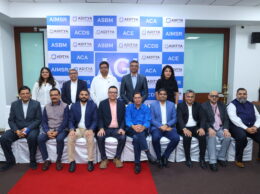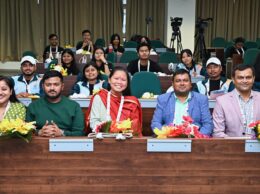Jamshedpur, 24th December 2018: XLRI- Xavier School of Management recently organised the ‘International Conference on The Changing Nature of Careers: Implications for a Sustainable World’ on 14th – 15th December, 2018. The conference, anchored by the Centre for Human Resource Development (CHRD) of XLRI, was co-chaired by Prof. Michael Arthur (Suffolk University, USA), Dr. Anneleen Forrier (KU Leaven, Belgium), and Dr. R K Premarajan (XLRI, India).
The two-day long conference witnessed eminent scholars from India and other countries and industry practitioners brainstorm on the changing nature of careers through paper presentations, expert talks and panel discussions.
Elaborating about the conference, Dr. R K Premarajan, Chairperson, Centre for HRD, XLRI and Co-chair of the Conference said, “A woefully inadequate focus on industry-academia collaboration is indeed holding back effective interventions premised on sound theory in the field of career and talent management. With this Conference, we sought to balance inspiration and implementation by linking practitioners from the world of corporate careers and scholars from the world of academics to share their ideas and experiences.”
The event kick-started with the inaugural session, where delivering the Welcome Address, Fr. E. Abraham S.J., Director, XLRI expressed hope that the conference would provide the platform to re-invent traditional career and workplace models, thus making it easier for people to utilize new skill-sets and leverage new roles within organizations. In his address, he said, “Discussions about the employment impact of change have often been polarized between those who foresee limitless opportunities in newly emerging job categories and prospects that improve workers’ productivity and liberate them from routine work, and those doubting Thomases that foresee massive labour substitution and displacement of jobs. Academics, chief executives and labour leaders hold strong and diverse views on the debate, as do policymakers. While forecasts vary by industry and region, momentous change is underway. Ultimately, it is our actions today that will determine whether that change mainly results in massive displacement of workers or the emergence of new opportunities in the workplace.”
Dr. Anneleen Forrier, Professor, KU Leaven, Belgium and Co-chair of the Conference delivered the Keynote Address and spoke on ‘Employability in a Shifting Global Employment Arena’. In her address, she said, “The nature of the employment relationship itself is becoming more short-term and flexible, leading to the emergence of contingent work and the so-called ‘gig economy’. Hence, the Conference aims to examine how these changing work relationships impact careers.”
On the occasion, there was a book signing event by Michael Arthur of his recent book ‘An Intelligent Career Taking Ownership of Your Work and Your Life’ co-authored with Svetlana N. Khapova, and Julia Richardson.
The first day of the conference held multiple Paper Sessions, where researchers and academicians from India and other countries presented papers on topics – ‘Cities, Clusters and Careers’, ‘Women’s careers: Opting in versus opting out’ and ‘Career Transitions in unpredictable times’.
The Practitioners Sessions provided platform for Industry experts to exchange views and share their experiences. The first session on the topic ‘Multiple Perspectives on Career and Talent Management’ was participated by Gaurav Lahiri- Partner, Deloitte, Madhu Veeraraghavan- Director, T.A. Pai Management Institute, Sumit Neogi- VP, HR, Reliance Industries, and Shatrunjay Krishna- Korn Ferry; Nishith Mohanty- CHRO, Manipal Group while the second session, on the topic ‘Career and Talent Development Challenges in a Gig Economy’ was participated by Dipti Sharma- Accenture, Ajay Sonkar- Adobe, Arinban Gupta- Aon Consulting Pvt. Ltd., Tooba Modassir- Citi Bank, Sachin Vohra and Nitin Nangia- Quess Corporation and Sandeep Olkar, Wipro.
The final session of the day was the Panel Discussion. Chaired by Dr. Munish Thakur, XLRI, the panelists at the session were Dr. Tammy Allen, University of South Florida and Dr. Lillian Eby, University of Georgia, who discussed on the topic ‘Publishing Career Research in High Impact Journals’.
The second day of the conference commenced with Keynote Address by Dr. Michael Arthur, Professor Emeritus at Suffolk University and Co-chair of the Conference. He spoke on the topic ‘Career Ownership and Changing Employment Relationships’. The other sessions of the day consisted of – 5 Paper Sessions and the Plenary Session.
At the Paper Sessions, researchers and academicians presented papers on topics – ‘Career Orientation’, ‘Changing Employment Relationships: Perceived Organizational Support’, ‘Changing Employment Relationships: Managing Talent and New Ways of Working’, ‘Career Development and HRD Challenges’ and ‘Education and careers’.
The Plenary Session, chaired by Prof. Michael Arthur was participated by eminent speakers like – Madhavi Lall, CHRO Deutche Bank; Dr. Lillian Eby, University of Georgia; Dr. Tammy Allen, University of South Florida; R Sridhar, CHRO ITC and Dr. Jelena Zikic, York University who discussed on the topic ‘Career and Talent Management Challenges: Linking Theory and Practice’.
The two-day long conference concluded with a Post Conference Workshop by Dr. Michael Arthur on ‘The Intelligent Career Card Sort (ICCS) Career Exploration System: Its Application in Businesses and B-Schools’. The workshop gave a demo of ‘Intelligent Careers’ – a tool used to find the right job for the right person.
Talking about the conference, Co-chair Conference and Professor Emeritus at Suffolk University, Dr. Michael Arthur stated “A shifting global employment landscape has serious implications for careers in both developed and emerging economies, as jobs become increasingly complex, uncertain and challenging. Thus, understanding how people adapt to the changing nature of work and shape their careers is a central focus of the conference. If the world is to become a safer place, we need to invest more deeply in the careers of its workers and help them become more successful – not only in their careers but in their contributions to a wider peace. It will be a peace nurtured by shared understanding across nations – where career opportunities are open to all people, and markets are responsive to the skills those people can bring.”








